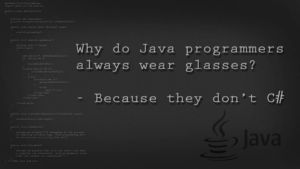Finding a job as a programmer in 2025 is like trying to catch a carp in January (carp hibernate and cannot be found). There are very few vacancies: even stable middles are unemployed, and some companies define specialists with 5 years of experience as “strong juniors.” In other words, the labor market is very sad, even in the US and Europe, and only seniors are being sought. So, how do you get out of this vicious circle and catch your crucian carp in early 2025? Let's figure it out right now.
According to the DEV rating, Python is the most comfortable and popular: “Python continues to be a top choice due to its simplicity, readability, and extensive libraries. It's widely used in data science, machine learning, web development, and automation.”
At present, there is an active growth of such top web development companies as:
- Net Solutions keeps its name trustworthy and popular because of custom product development, legacy platform modernization, and data-driven eCommerce solutions;
- Overcode offers several directions as technology solutions for startups and established businesses;
- EPAM helps world leaders design, develop, and implement software, offering expertise in engineering and product development. By doing so, it allows its clients to successfully solve the most complex business problems and effectively manage the digital transformation process from start to finish.
They are actively recruiting new qualified specialists and thinking about the “next generation” – those who are still learning the trade.
Top languages and why they are so important
The engineering field never takes shortcuts – rather, like a racehorse on a dry track that reaches speeds of up to 90 km/h. Languages are constantly changing, being reworked, and improved, and even Python is not the limit of the skills of the best specialists, such as Guido van Rossum from the Netherlands or Samuel Harris Altman from Illinois.
Rust or binary code? That's the question. But none of them takes at least one place in the top five. By the way, there's a popular meme about why each language was invented. In short, every next version or new programming language was invented to fix the previous one.
The point of developing new features is to make the syntax as understandable as possible. For the human brain, the aim is to make learning and becoming a specialist easier and simpler (but in practice, there are many more factors than language ease). So, who is in the top 5?
- Python is known for its simplicity and readable syntax, which makes it ideal for programming beginners. The language allows you to write code quickly and efficiently, which makes it popular among developers for rapid prototyping and development of various applications.
- JavaScript is the main programming language for web development that allows you to create interactive and dynamic websites. This language is often used to add dynamic elements to web pages, such as animations, viewing user actions, and manipulating HTML/CSS.
- Java = stability, which makes it suitable for corporate projects.
- Using C++ to create high-performance applications such as games, system software, and drivers. Programs can manage memory and other resources in detail, which ensures high efficiency and optimization.
- C# is designed for developers' convenience, providing a rich set of tools and libraries that simplify development.
And they are not in the lead because they are simple or easy (some are just the opposite). This rating is based on the requirements of employers on job search sites.
Programming is all about business. An entrepreneur will provide it and make a profit. The main reason why programmers are paid such fabulous fees is their usefulness for business. They can develop a convenient solution and figure out how to make certain processes easier. In general, studying something that modern employers don't need makes no sense.
What to choose for a beginner
If you understand what you want to write and what your heart is in, start now. The endless choice, jumping from language to language, the eternal question “What should I write?”, “What technology should I choose?” will only lead to chaos in your head. Remember the main rule: first, you get into IT, and only then do you string additional knowledge on this base like beads. That is, you can learn additional tricks after you successfully pass the interview and receive an offer.
It's true what they say: “A good programmer is a lazy programmer.” And now, we will prove why. If you are a young programmer, turn off your brain. Don't try to torture yourself with the choice: just open any video, “Top 10 programming languages” or “Professions 2025”, choose any, and start preparing. The difference between them (the jobs) is very small, especially when it comes to the prospect of the next 5 years. No matter what field, a great IT specialist's salary will still be high. And if you start digging in one place from the very beginning, you will definitely find your diamond.
And vice versa: if you start new paths 10 times, you may never reach your final destination. You will only waste time on empty beginnings. It's better to hit the same point for 3 years and achieve a result than still treading water during this time.
How to build a learning process
Everything brilliant is simple. You need to devote time to it every day - at least an hour a day. We're sure it takes much more than that to play computer games. Why not spend this period of time allotted to you by fate wisely and for the benefit of your future?
This hour should be all about practice: solving problems, writing code, watching tutorials, repeating/improving them, etc. Theory is separate and should be equal to practice while you are a beginner. For example, you learn what loops are and immediately go to solve problems with them. Do this, and you will never have a headache thinking about the future. If you repeat it every day, you will quickly master most topics. Some of them will take 3 lessons, some - just one, but after a whole week, you will have a lot of knowledge in your head from the hours you've spent.
There are various platforms for beginners and experts of any level: Codewars (algorithms) or LeetCode (professional tasks created by real companies, real problems that arise in business). From them, you will at least learn the basis with which you can move on from your own pet projects from the university codenamed “calculator.”
The best strategy would be to choose 5-10 vacancies that you would like to apply for in the future and highlight the skills that employers require. What do they have in common? For example, a data scientist needs to have:
- knowledge of math;
- knowledge of libraries (Pandas, scatterplots, PyTorch);
- SQL;
- non-SQL;
- higher education.
These main points coincide with the vacancies, followed by various technologies, knowledge of specific programs, etc. Experts also advise uploading projects in your portfolio with the features that are emphasized in the vacancies. Then it all depends on how regular your classes will be. Of course, everyone has downtime when you can't take on a particular task for a week, but it's important to get back to it as soon as possible. Once you've started, don't quit. And if such “vacations” last for more than 2 months, you may need to start all over again. Don't throw away your progress for the sake of “5-minute” pleasures. Remember your goal and strive for it!


